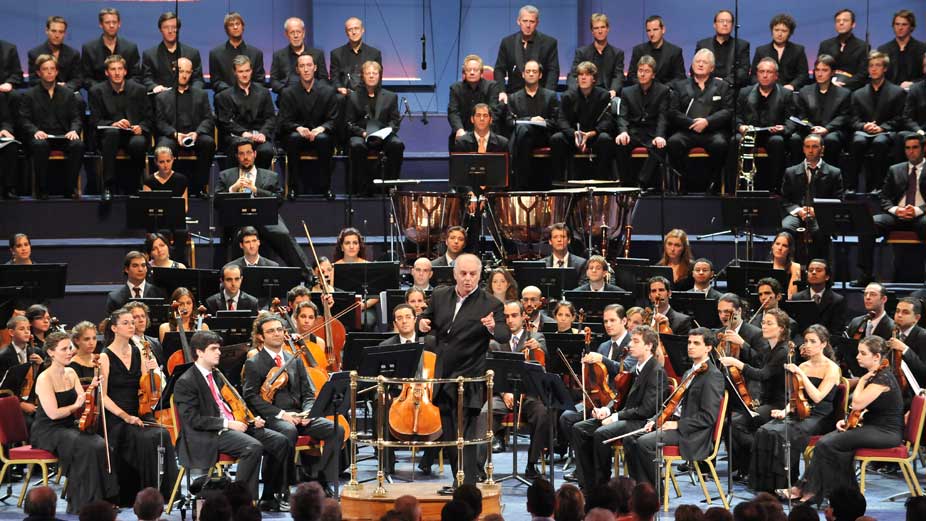Barenboim and his West-Eastern Divan Orchestra at the Proms

Music, particularly in live performance, is arguably the most potent and emotional of art forms. Few who saw it will forget Lenny Bernstein’s concert on Christmas Day 1989 when he turned Beethoven’s 9th Symphony from an “Ode to Joy” to an “Ode to Freedom” to celebrate the fall of the Berlin Wall. The mechanics of great a concert are one thing, the circumstances something else.
When Daniel Barenboim stood in front of the audience at the end of last night’s concert by his “West-Eastern Divan Orchestra” the applause was deafening and heartfelt. It was certainly a good concert, but the audience’s tribute clearly went beyond this. It was the giving of overwhelming support not just to the music but to the idea. That idea is, in Barenboim’s words (in a recent interview in the Daily Telegraph”):
“…that there can never be a military solution to this conflict…[about] two nations [Israel and Palestine] who are absolutely convinced that they have equal claims to live on the same little patch of earth, preferably without the other”
The Orchestra comprises young musicians form Israel, Palestine and several Arab countries. It’s goal is to “…promote coexistence and intercultural dialogue” . In a part of the world where the silence of the absence of such dialogue is deafening Barenboim’s initiative, now 15 years old, is a tiny sweet sound of hope. Maybe that is why this concert, after the interval, was all Ravel. The melodies of the “Rapsodie espagnole”, the “Alborada del gracioso”, the “ Pavane pour une infante défunte” and the great “Bolero” seduce your feelings and dare you to think anything but peaceful thoughts. But in that same interview Barenboim has no unreal dreams:
“It’s not an orchestra for peace in the region, because peace requires that the needs of both sides for justice and security are met. Playing Mozart or Wagner cannot give this.” Quite so!
Barenboim is passionate, what great artist is not, but he is a realist. In his Reith lectures in 2006 he said this about music:
“Music has a power beyond mere words. It has the power to move us, and it has the sheer physical power of sound, as we know.”
But he does not duck the politics either but gives it a musical metaphor – from the same Reith lecture:
“Therefore in my view the future of the State of Israel must develop and find the golden mean that will lead to harmonious internal and external relations, just as in a piece of music its harmony can be achieved even if it is made up of conflicting elements, albeit of the strongest and most radical nature, as long as each element can develop itself to its fullest.… To quote Martin Buber “There can be no peace between Jews and Arabs that is only a cessation of war. There can only be a peace of genuine co-operation.' Therefore peace requires dialogue, a dialogue which consists of sensitive talking and often painful listening.”

And this really is the key to the West-Eastern Divan Orchestra. The metaphor of the need for harmony and cooperation across all of the band’s young players whatever part of their shared “little patch of earth” they are from. It was a shame that one or two missed this point last night when (see above) they chose to unfurl Palestinian flags. This nationalistic statement so misses the point doesn't it? But then the world of music is not innocent of ignorance either. A few years ago the famous flautist James Galway said this in the BBC Music Magazine:
Quite why Galway chose to be so offensive I’ve no idea. I wrote to the magazine to protest as follows:
“It was disappointing to read Sir James Galway’s churlish belittling of Daniel Barenboim’s West-Eastern Divan Orchestra and his ignorant and naïve assertion that “…music should have nothing to do with politics” (“Music Stand” October 2008). There is politics in music, as there is politics in all aspects of life and to recognise, as Barenboim has done, that music can be a force for good in the world is noble and moving. Music will not solve the problems of the world but, as many have shown, it can help. The Simon Bolivar Youth Orchestra has helped thousands escape poverty in Venezuela; Barenboim has broken down barriers in the Middle East and Bernstein celebrated the downfall of communism in Berlin. Just three amongst countless examples of how music can make a difference - as a musician Sir James should celebrate this, not sneer.”
BBC Music Magazine did not publish nor acknowledge my letter. Perhaps they were embarrassed. But the lesson is, of course, that while anyone who attended the BBC Prom last night cannot not have been moved we should never take anything for granted – except, perhaps, that music will always have the power to reduce us to tears of emotion and feeling.


0 Comments:
Post a Comment
<< Home